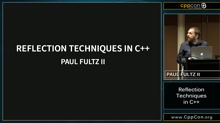CppChat 2015-08-14 boost and C++ Standard -- Jon Kalb
Video chat:
CppChat 2016-08-14 with Matt and Robert
with Matt Calabrese, Robert Ramey, and Jon Kalb
From the chat:
We discuss Boost, the Boost Incubator, the review process, and the role of Boost in standardization.

 Have you registered for CppCon 2016 in September? Don’t delay –
Have you registered for CppCon 2016 in September? Don’t delay –  Have you registered for CppCon 2016 in September? Don’t delay –
Have you registered for CppCon 2016 in September? Don’t delay – 
